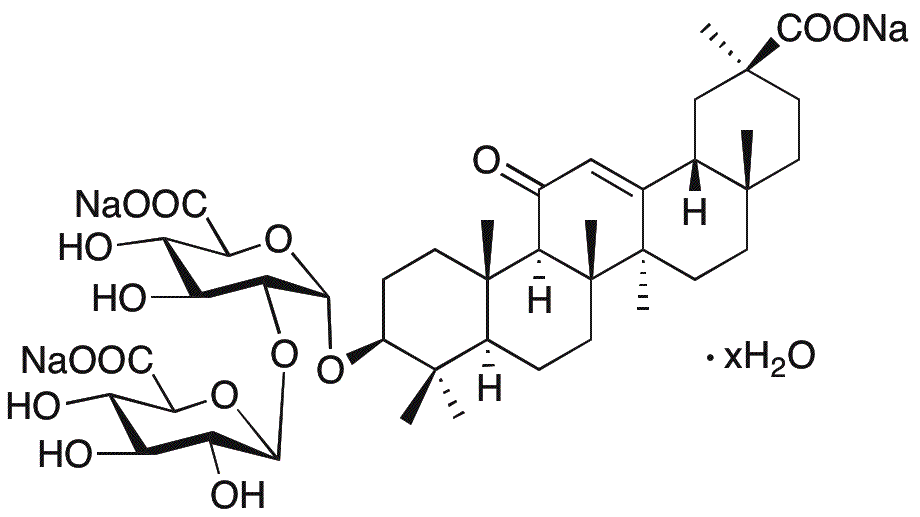Trisodium glycyrrhizinate hydrate is widely utilized in research focused on various practical applications:
- Cosmetic Industry: This compound is commonly used in skincare products due to its anti-inflammatory and soothing properties, making it effective for sensitive skin and conditions like eczema.
- Pharmaceuticals: It serves as an ingredient in formulations aimed at liver health, as it can help protect liver cells and support detoxification processes.
- Food Industry: As a natural sweetener and flavor enhancer, it is often used in food products, providing a sweet taste without the calories associated with sugar.
- Research Applications: In laboratory settings, it is used as a standard in studies related to glycyrrhizin and its effects, helping researchers understand its biological activities.
- Veterinary Medicine: It is also applied in veterinary formulations to support the health of animals, particularly in products aimed at reducing inflammation and promoting overall wellness.
General Information
Properties
Safety and Regulations
Applications
Trisodium glycyrrhizinate hydrate is widely utilized in research focused on various practical applications:
- Cosmetic Industry: This compound is commonly used in skincare products due to its anti-inflammatory and soothing properties, making it effective for sensitive skin and conditions like eczema.
- Pharmaceuticals: It serves as an ingredient in formulations aimed at liver health, as it can help protect liver cells and support detoxification processes.
- Food Industry: As a natural sweetener and flavor enhancer, it is often used in food products, providing a sweet taste without the calories associated with sugar.
- Research Applications: In laboratory settings, it is used as a standard in studies related to glycyrrhizin and its effects, helping researchers understand its biological activities.
- Veterinary Medicine: It is also applied in veterinary formulations to support the health of animals, particularly in products aimed at reducing inflammation and promoting overall wellness.
Documents
Safety Data Sheets (SDS)
The SDS provides comprehensive safety information on handling, storage, and disposal of the product.
Product Specification (PS)
The PS provides a comprehensive breakdown of the product’s properties, including chemical composition, physical state, purity, and storage requirements. It also details acceptable quality ranges and the product's intended applications.
Certificates of Analysis (COA)
Search for Certificates of Analysis (COA) by entering the products Lot Number. Lot and Batch Numbers can be found on a product’s label following the words ‘Lot’ or ‘Batch’.
Numéro de catalogue
Numéro de lot/série
Certificates Of Origin (COO)
This COO confirms the country where the product was manufactured, and also details the materials and components used in it and whether it is derived from natural, synthetic, or other specific sources. This certificate may be required for customs, trade, and regulatory compliance.
Numéro de catalogue
Numéro de lot/série
Safety Data Sheets (SDS)
The SDS provides comprehensive safety information on handling, storage, and disposal of the product.
DownloadProduct Specification (PS)
The PS provides a comprehensive breakdown of the product’s properties, including chemical composition, physical state, purity, and storage requirements. It also details acceptable quality ranges and the product's intended applications.
DownloadCertificates of Analysis (COA)
Search for Certificates of Analysis (COA) by entering the products Lot Number. Lot and Batch Numbers can be found on a product’s label following the words ‘Lot’ or ‘Batch’.
Numéro de catalogue
Numéro de lot/série
Certificates Of Origin (COO)
This COO confirms the country where the product was manufactured, and also details the materials and components used in it and whether it is derived from natural, synthetic, or other specific sources. This certificate may be required for customs, trade, and regulatory compliance.


